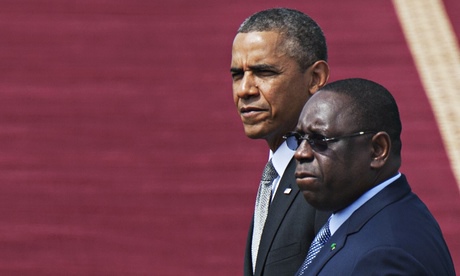 Barack Obama and Senegalese President Macky Sall. ‘Under his presidency, Africa has been neglected or its views ignored.’ Photograph: Joe Penney/REUTERS
Barack Obama and Senegalese President Macky Sall. ‘Under his presidency, Africa has been neglected or its views ignored.’ Photograph: Joe Penney/REUTERS
President Barack Obama’s summit with African leaders is the largest gathering of the continent’s heads of state with a sitting US leader. As its official website declares, in Obama’s words: “I see Africa as a fundamental part of our interconnected world – partners with America on behalf of the future we want for all of our children.”
The statement is laudible. However, that so many African leaders have turned up – representing all bar Zimbabwe, Sudan and Eritrea, who have poor relations with either the US or the African Union – should not obscure the fact that under the Obama presidency there have been significant setbacks for the African cause.
Two key African reverses stand out: on the economic front, US investment in Africa has visibly slowed; on the political front, US-led interventions to ostensibly bring “peace” have caused more destabilisation.
Obama, the first leader of African descent in the White House, was initially hailed by many on the continent as a friend, one of our own, and the kind of leader many Africans wished they had in their own countries. Many believed the continent would finally be elevated to genuine partner status alongside the US. However, under his presidency, Africa has been neglected or its views ignored, often leading to disastrous interventions which in some areas have made the continent a more dangerous place.
Since his election win, Obama has yet to give a state dinner to an individual African leader, and even during the summit there will be few opportunities for one-on-one interactions with him. There appear to be no concrete plans to produce a joint US-Africa action plan.
According to figures by the Brookings Institute, China overtook the US as Africa’s largest country trading partner in 2009. In 2013, US trade with Africa fell to $60bn (£35bn), compared to China at $170bn, and the European Union at $200bn.
As US trade with Africa declined under Obama, the continent has seen the longest consistent growth spurt since independence from colonial rule, fuelled mostly by trade and investments from emerging economies such as China, India, Brazil and Turkey.
This has been accompanied by the decline of US democratic influence in Africa, strengthening the hand of those leaders such as Uganda’s Yoweri Museveni and Zimbabwe’s Robert Mugabe, who believe Africa does not need democracy – because China’s growth supposedly shows that development can happen without it.
Last week, a Brics development bank – encompassing Brazil, Russia, India, China and South Africa – was launched in opposition to the World Bank and International Monetary Fund because appeals to give Africa and developing countries a greater say in these institutions has fallen on deaf ears in the US.
Joyce Banda, the Malawian leader, lost the elections in her country this year partially because, in return for development aid, she was forced to introduce ruinous IMF reforms , which included devaluation of the currency and abolishing subsidies for the vulnerable and help for farmers, unleashing widespread popular anger. Many Africans had hoped that Obama would help leaders such as Banda to gain the policy space to pursue the right policies for her country, just like the richer industrial nations do.
However, arguably the greatest damage done by Obama is his continuation of the “war on terror” policy, which has destabilised Africa, led to an upsurge in religious fundamentalism and undermined economic growth.
Many African despots have used the pretext of the war on terror to crush legitimate opposition groups, and this war has also given many African extremist groups a cause to fight for. The aftermath of the US-led war in Libya brought more weapons and armed fundamentalist groups into surrounding countries such as Mali.
Rather than wars, the most effective antidote to religious fundamentalism is bringing inclusive democracy and development to all citizens. It is significant that Obama did not invite Africa’s civil society groups to his summit. Under the Obama administration, funding to these groups – which have the potential to build a new generation of credible African leaders and bring long-term economic prosperity – has declined considerably.
Yes, Africa needs the US. But the continent needs a new deal, based on a genuine partnership of equals. Obama can still potentially re-forge the US-Africa partnership in new terms, to promote democracy, inclusive development and peace. But time is running out.















